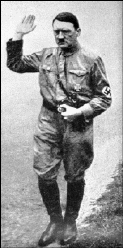Gareth Jones
[bas relief by Oleh Lesiuk]
HOME |
Stop Press |
Complete Soviet Articles & Background Information |
Précis of Gareth's
|
All Published Articles |
BOOKS
|
|
|
|
More Than Grain of Truth(2005) |
|
|
TOPICAL
'Are you Listening NYT?' U.N. Speech - Nov 2009 |
Gareth Recognised at Cambridge - Nov 2009 |
Reporter and the Genocide - Rome, March 2009 |
Order of Freedom Award -Nov 2008 |
Premiere of 'The Living' Documentary Kyiv - Nov 2008 |
Gareth Jones 'Famine' Diaries - Chicago 2008 |
Aberystwyth Memorial Plaque 2006 |
GENERAL
Scholarship Fund |
Site Map |
Links |
Legal Notices |
Sponsored Links |
Contact |
THE WESTERN
MAIL & SOUTH WALES NEWS, August 2nd 1934
THREE CATASTROPHES IN A MONTH
From GARETH JONES
BERLIN, Wednesday.
“The
President, Field-marshal von Hindenburg is gravely ill. Herr Hitler is on
his way to the President’s estate in Neudeck, East Prussia, and we are fearing
the worst.” The
German diplomat who ponderously announced this news to me looked anxious and
wan, and wherever men and women heard that all hope for the President’s life
had been abandoned there was a glint of fear in their eyes. To
them it was the latest of three catastrophes which have shaken Germany within
the short space of a month. Out
of the blue on June 30 had come the ruthless stamping out of the Roehm revolt,
which destroyed not only the bodies of men but the soul of a movement, and which
has left rancor in the hearts of thousands of storm troopers. A Crushing
Defeat
On July 25, the greatest ambition of the National Socialists in foreign affairs to regain the soil of Austria, sacred to them not only for the Germanic race of its countrymen, but for having brought to the world the Leader, Hitler-was dashed to the ground and converted into a crushing defeat which has humiliated them before the world [Assassination of Dolfuss in failed Austrian Putsch] Now
comes the third catastrophe, the fear of the disappearance of the strongest link
with the German past and of the most reasonable and restraining force in German
politics-Hindenburg. For
many Germans it is a terrifying prospect because it will be a break with some of
the most glorious days of German history; with the solid bourgeois virtues of
pre-War days, and with the old Prussian conceptions of honour, military justice,
and duty. Many
reflect that Hindenburg was a young lieutenant at the time of the founding of
the German Empire in 1871, and feel that with his death there will pass an era
which, in spite of its militarism, has had admirable qualities. With
Hindenburg’s death there will probably be a renewed struggle for power, more
bitter, I believe, than before in the history of National Socialism in
Germany. It was due to Hindenburg’s personal influence that many posts
in certain Ministries, such as the Foreign Office and the War Ministry, were in
the hands of Nationalists-conservative men who have been revolted by the
excesses of the revolutionaries in the national Socialist party. It
has been largely due to Hindenburg’s influence that many of the Ministers have
not been National Socialists, although they have paid lip service to its ideals
and to its leaders. With
Hindenburg’s passing the fight for these posts will begin. Young Nazis,
feeling themselves deprived of power and pay by the continuance of the
Conservatives in privileged places, will seek to capture those prizes of
authoritative posts which are now withheld from them. Banner of
Monarchy
The
Right Wing will probably make a vigorous fight, and perhaps will win, because
they have the Army and the Steel Helmets on their side. They will, perhaps, wave
the banner of Monarchy, and will greet the return of the Kaiser or of another of
the Hohenzollerns. These
are only suppositions and no one can foretell future events here. But of
the two elements, revolutionary Nazis seeking power, and the Conservatives, it
is probable that the Conservatives will win. Upon the struggle the
publication of Hindenburg’s political testament will have a great
influence. Mutual Hatred
In
the struggles between Left and Right the S.S. men (black uniformed elite of the
Storm Troopers) will range’ themselves with the Army and the Steel Helmets.
These S.S. men have won the enmity of thousands of the Brownshirts, and I
believe that the mutual hatred will grow. What
of Hindenburg’s successor? It is possible that the great old man has been the
last President; that there will not again be a Presidential election, and that
Hitler will make himself “Leader.” |
Adolf Hitler, Chancellor of Germany. |
||||||||
|
|||||||||




